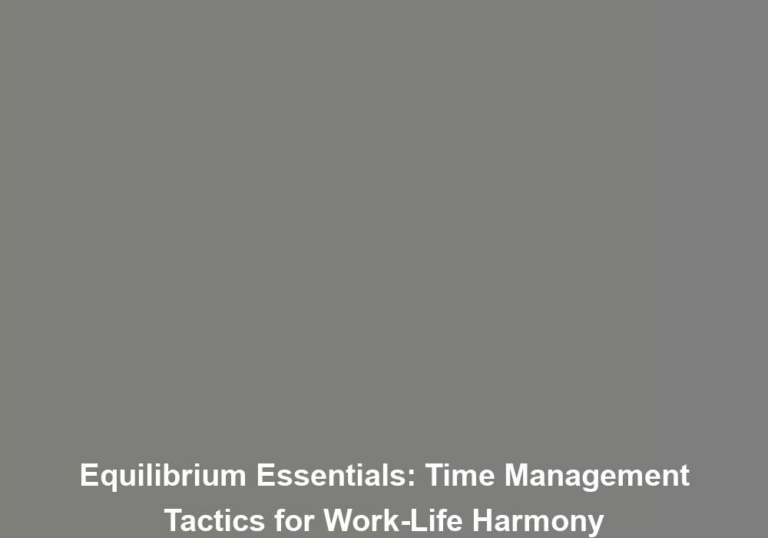Time Tamed: Mastering the Clock with Healthy Habits
Struggling to stay on top of your schedule? Managing time can feel like a constant challenge, but with the right healthy habits, it can become a seamless part of your daily routine. From setting boundaries to prioritizing self-care, there are numerous strategies to master the clock and make the most of your day. But how exactly can you incorporate these habits into your life, and what impact can they have on your overall well-being?
Understanding Time Management
Understanding time management is crucial for maximizing productivity and minimizing stress in your daily life. Your time perception greatly influences how you manage tasks and achieve a work-life balance. Time is a precious resource, and how you perceive it can impact your ability to juggle various responsibilities effectively.
When it comes to time perception, everyone experiences it differently. Some individuals may feel that time flies by, while others might find it drags on. Understanding your own time perception can help you tailor your schedule to match your natural rhythms. By doing so, you can work with your internal clock rather than against it, leading to increased efficiency and reduced stress.
Achieving a work-life balance is intricately tied to effective time management. By allocating your time wisely, you can ensure that both your professional and personal life receive the attention they deserve. This balance is essential for your overall well-being and satisfaction. It allows you to excel in your career while also nurturing relationships, pursuing hobbies, and taking care of your mental and physical health.
Mastering time management isnG??t about squeezing every minute out of the day; itG??s about making the most of the time you have in a way that aligns with your priorities. Understanding your time perception and using it to establish a healthy work-life balance can lead to a more fulfilling and harmonious life.
Establishing Boundaries
Now, letG??s talk about setting clear limits, defining your personal space, and creating time boundaries. ItG??s important to establish boundaries to protect your time, energy, and overall well-being. By setting clear limits and defining your personal space, you can create a healthier balance in your life.
Setting Clear Limits
To maintain a healthy balance in your life, itG??s crucial to set clear limits and establish boundaries that prioritize your well-being and goals. Setting boundaries and practicing time discipline are essential for creating a fulfilling and productive lifestyle. HereG??s a simple guide to help you set clear limits:
| Step | Description | Example |
|---|---|---|
| Identify priorities | Determine what matters most to you and allocate your time and energy accordingly. | Spending quality time with family. |
| Learn to say no | DonG??t overcommit yourself. Politely decline tasks or activities that donG??t align with your priorities. | Politely declining extra work when your schedule is full. |
| Set time boundaries | Allocate specific time slots for different activities to avoid overextending yourself. | Designating 1 hour for exercise daily. |
| Practice self-care | Allocate time for relaxation, hobbies, and self-care to prevent burnout. | Setting aside 30 minutes daily for meditation or reading. |
| Communicate openly | Clearly communicate your boundaries to friends, family, and colleagues to ensure they respect your time and needs. | Letting your friends know your available times for social gatherings. |
Defining Personal Space
Establishing clear personal boundaries is essential for maintaining a healthy balance in your life and ensuring your well-being. Setting boundaries allows you to create healthy limits and carve out personal time for yourself. ItG??s okay to prioritize alone time for self-reflection, relaxation, or pursuing activities you enjoy. By establishing and communicating your need for personal space, you can prevent feelings of being overwhelmed or burnt out. ItG??s important to recognize that setting boundaries is not selfish; itG??s a vital part of self-care. Communicate your needs with empathy and understanding, and be respectful of othersG?? boundaries in return. Embracing personal space can lead to improved mental and emotional well-being, allowing you to show up as your best self in your relationships and daily life.
Creating Time Boundaries
Consider setting specific time boundaries to prioritize your well-being and create a healthy balance in your daily life. Setting boundaries around your time allocation can help you maintain a sense of control and reduce stress. Begin by identifying your priorities and allocating dedicated time for them. This could involve designating specific hours for work, leisure, exercise, and rest. Communicate these boundaries to those around you, whether itG??s colleagues, friends, or family, so they understand and respect your schedule. ItG??s also important to learn to say no when necessary, protecting the time youG??ve allocated for your well-being. By establishing clear time boundaries, you can cultivate a more balanced and fulfilling life, ensuring that you have the time and energy for what truly matters to you.
Prioritizing Self-Care
Make self-care a top priority in your daily routine to ensure you are taking care of both your mental and physical well-being. Prioritizing self-care involves dedicating time for self-reflection and nurturing self-compassion. ItG??s essential to recognize that taking care of yourself is not selfish; itG??s a fundamental aspect of maintaining overall well-being. By incorporating self-care into your daily life, you can improve your resilience, reduce stress, and enhance your overall quality of life.
Start by setting aside time for self-reflection. This could be as simple as taking a few minutes each day to check in with yourself, assess your feelings, and identify sources of stress. Engaging in activities such as journaling, meditation, or deep breathing exercises can help you connect with your inner thoughts and emotions, promoting a sense of self-awareness and understanding.
Additionally, practicing self-compassion is crucial for maintaining a healthy relationship with yourself. Treat yourself with the same kindness and understanding that you would offer to a friend facing similar challenges. Acknowledge your struggles without judgment and respond to yourself with empathy and support. Cultivating self-compassion can foster resilience and improve your ability to cope with lifeG??s inevitable ups and downs.
Creating Efficient Routines
Ready to take your daily routine to the next level? LetG??s explore the secrets to optimizing your schedule, mastering time management techniques, and incorporating productive habits into your day. By creating efficient routines, you can maximize your productivity and create more time for the things that truly matter.
Daily Schedule Optimization
Optimizing your daily schedule involves crafting efficient routines that maximize productivity and minimize wasted time. To achieve this, consider implementing the following strategies:
- Time Blocking: Allocate specific time slots for different tasks, allowing you to focus on one task at a time without distractions.
- Task Batching: Group similar activities together to capitalize on efficiency and minimize context switching, such as responding to emails or making phone calls in designated time blocks.
- Prioritizing Self-Care: Incorporate dedicated time for self-care activities like exercise, relaxation, and socializing to maintain a healthy work-life balance.
Time Management Techniques
Crafting efficient routines for time management involves leveraging time blocking, task batching, and prioritizing self-care, which were discussed in the previous subtopic on daily schedule optimization. To effectively manage your time, start by time tracking to understand how you currently allocate your hours. This will help you identify areas where time is being underutilized or wasted. Next, prioritize tasks based on their importance and urgency. This allows you to focus on high-value activities and ensures that critical tasks are completed promptly. Additionally, creating a structured routine through time blocking and task batching can help you maximize productivity. By dedicating specific time slots to particular activities, you can minimize distractions and work more efficiently. Remember, effective time management is essential for maintaining a healthy work-life balance and reducing stress.
Productive Daily Habits
Developing productive daily habits is essential for creating efficient routines that allow you to maximize your time and accomplish your goals. To achieve this, consider implementing the following habits:
- Time Blocking: Allocate specific time slots for different tasks to maintain focus and productivity.
- Goal Setting: Set clear, achievable goals to provide direction and motivation for your daily activities.
- Mindful Eating, Exercise Routine: Prioritize healthy eating habits and regular exercise to boost energy levels and enhance overall well-being.
Overcoming Procrastination
To overcome procrastination, start by identifying the tasks that you tend to put off and setting specific, achievable deadlines for completing them. Procrastination often stems from feeling overwhelmed or unsure where to start. By breaking tasks into smaller, manageable steps and setting deadlines for each, you can overcome avoidance habits and reduce procrastination pitfalls.
Another effective strategy for overcoming procrastination is to create a routine that includes dedicated time for tackling tasks you tend to avoid. By incorporating these tasks into your regular schedule, you can establish a habit of addressing them consistently, making it easier to overcome procrastination.
ItG??s important to recognize the underlying reasons for your procrastination. Are you avoiding a task because itG??s challenging or because you donG??t enjoy it? Understanding the root cause can help you develop strategies to address and overcome procrastination.
Additionally, consider enlisting the support of friends, family, or colleagues. Being held accountable by others can provide the motivation you need to tackle tasks and avoid falling into the procrastination trap.
Remember that overcoming procrastination is a process that requires patience and self-compassion. Celebrate your progress, no matter how small, and be gentle with yourself if you experience setbacks. By implementing these strategies and developing healthy habits, you can effectively overcome procrastination and reclaim control of your time and productivity.
Sustaining Healthy Habits
When sustaining healthy habits, itG??s important to make gradual adjustments and focus on consistency to ensure long-term success. Building a sustainable healthy lifestyle is a journey, and itG??s normal to face challenges along the way. Here are some key strategies to help you maintain your healthy habits:
-
Consistency Challenge: Embracing healthy habits is not always easy, and staying consistent can be a challenge. ItG??s okay to have occasional setbacks, but the key is to keep moving forward. Celebrate your progress and be kind to yourself when facing obstacles. Remember, small steps taken consistently lead to significant results over time.
-
Habit Tracking: Tracking your habits can be a powerful tool for sustaining healthy behaviors. Whether itG??s using a journal, a habit-tracking app, or a simple checklist, monitoring your progress can provide valuable insights and motivation. Seeing your improvement over time can reinforce your commitment and inspire you to keep going.
-
Community Support: Surrounding yourself with like-minded individuals who share your commitment to healthy living can greatly impact your ability to sustain positive habits. Whether itG??s joining a fitness class, finding a supportive online community, or involving friends and family in your journey, having a support system can provide encouragement, accountability, and a sense of belonging.
Conclusion
So, remember, time management isnG??t just about being productive, itG??s about living a balanced and fulfilling life. Did you know that 80% of people feel stressed about not having enough time in the day? By implementing healthy habits and creating efficient routines, you can take control of your time and reduce that stress. ItG??s time to tame the clock and prioritize your well-being. YouG??ve got this!







